Charles E W Bean, Diaries, AWM38 3DRL 606/251/1 - 1915 - 1936 - Part 9
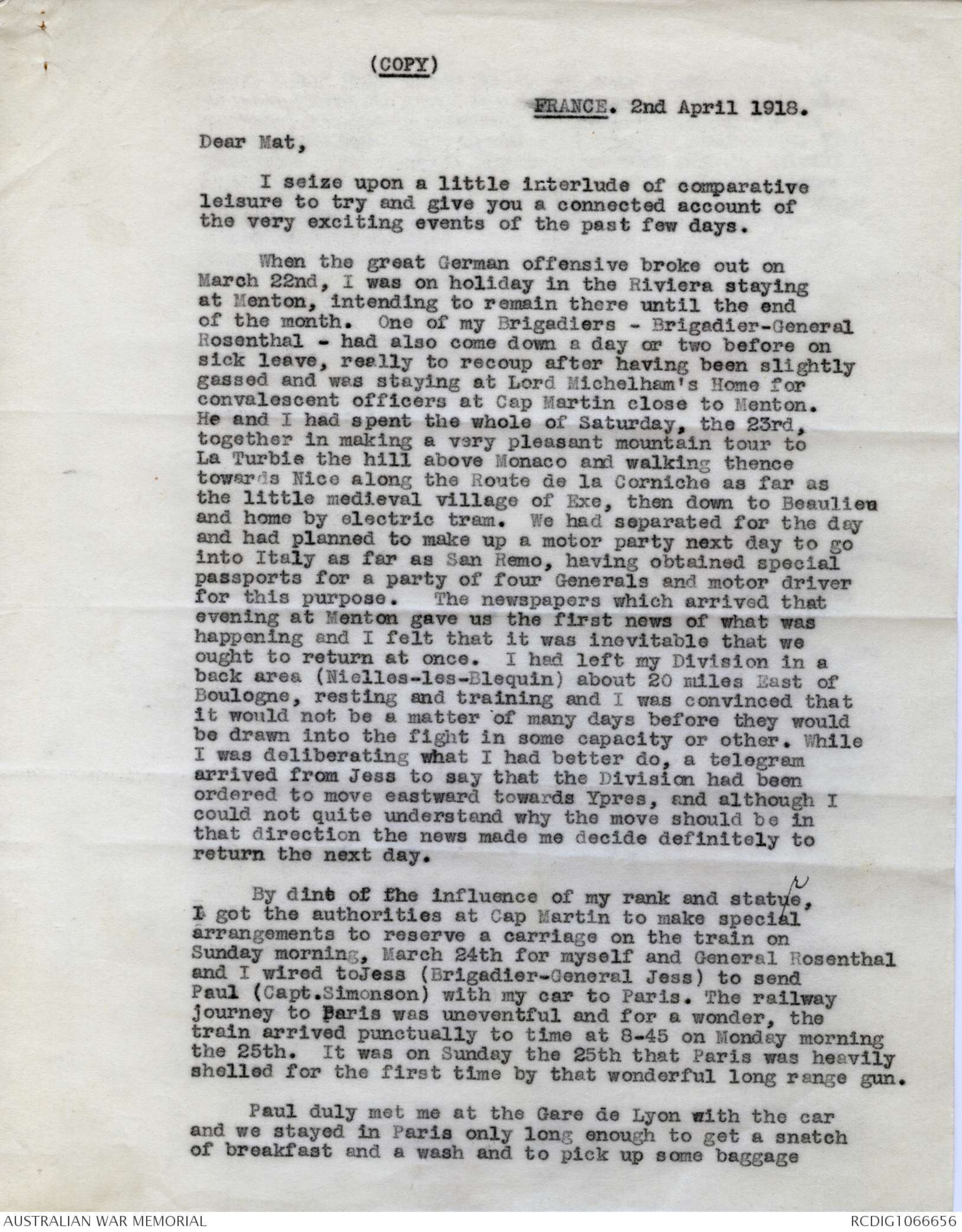
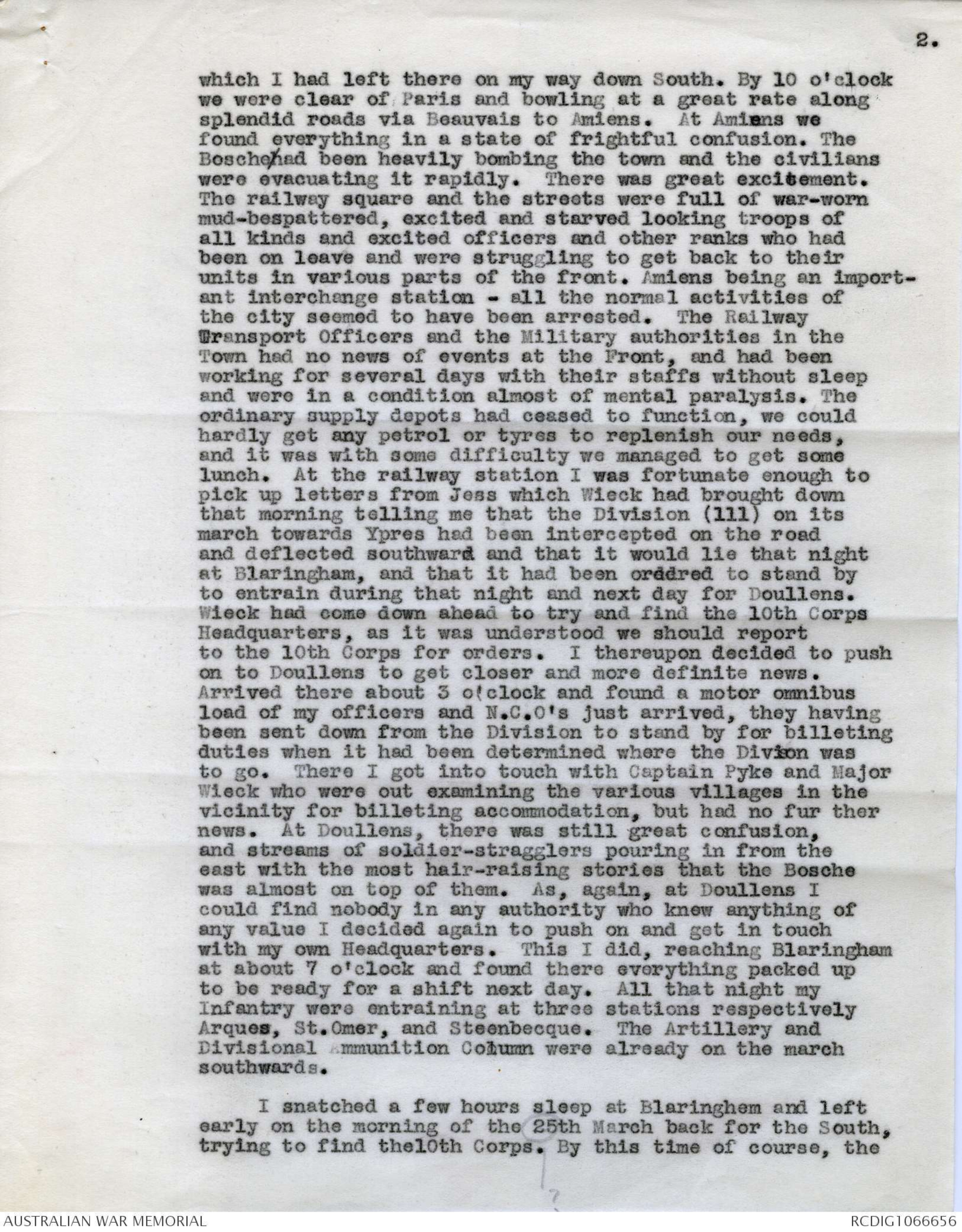
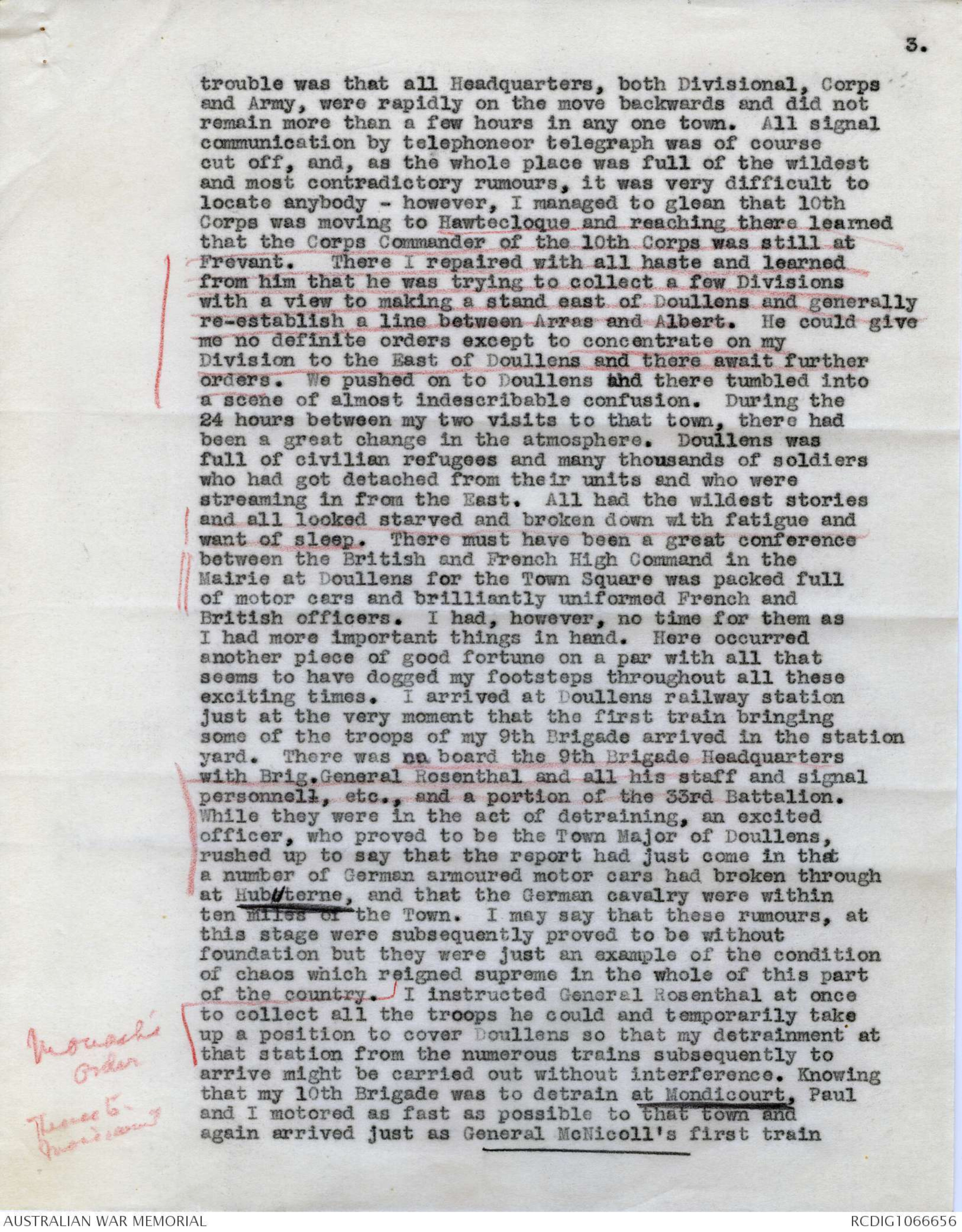
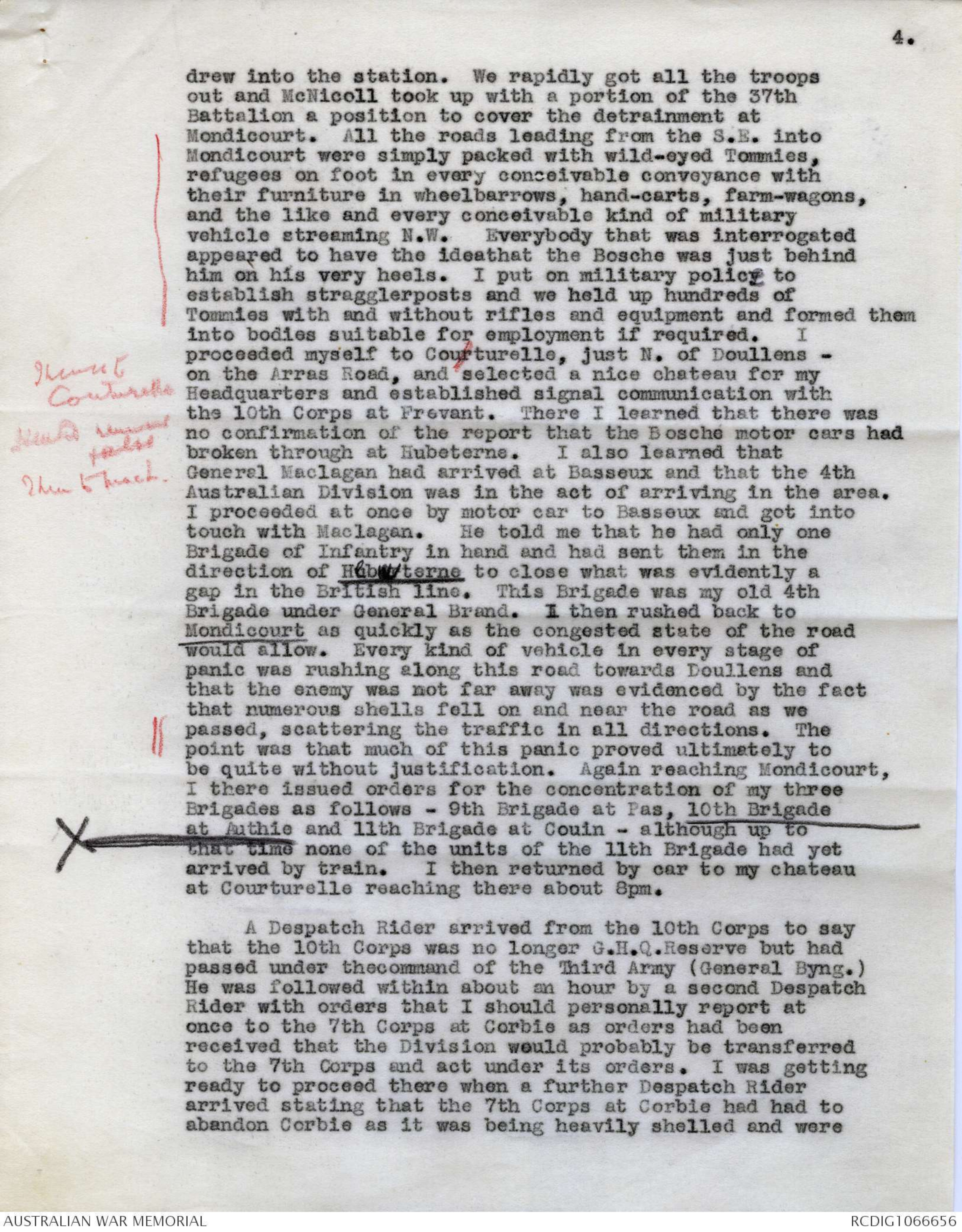
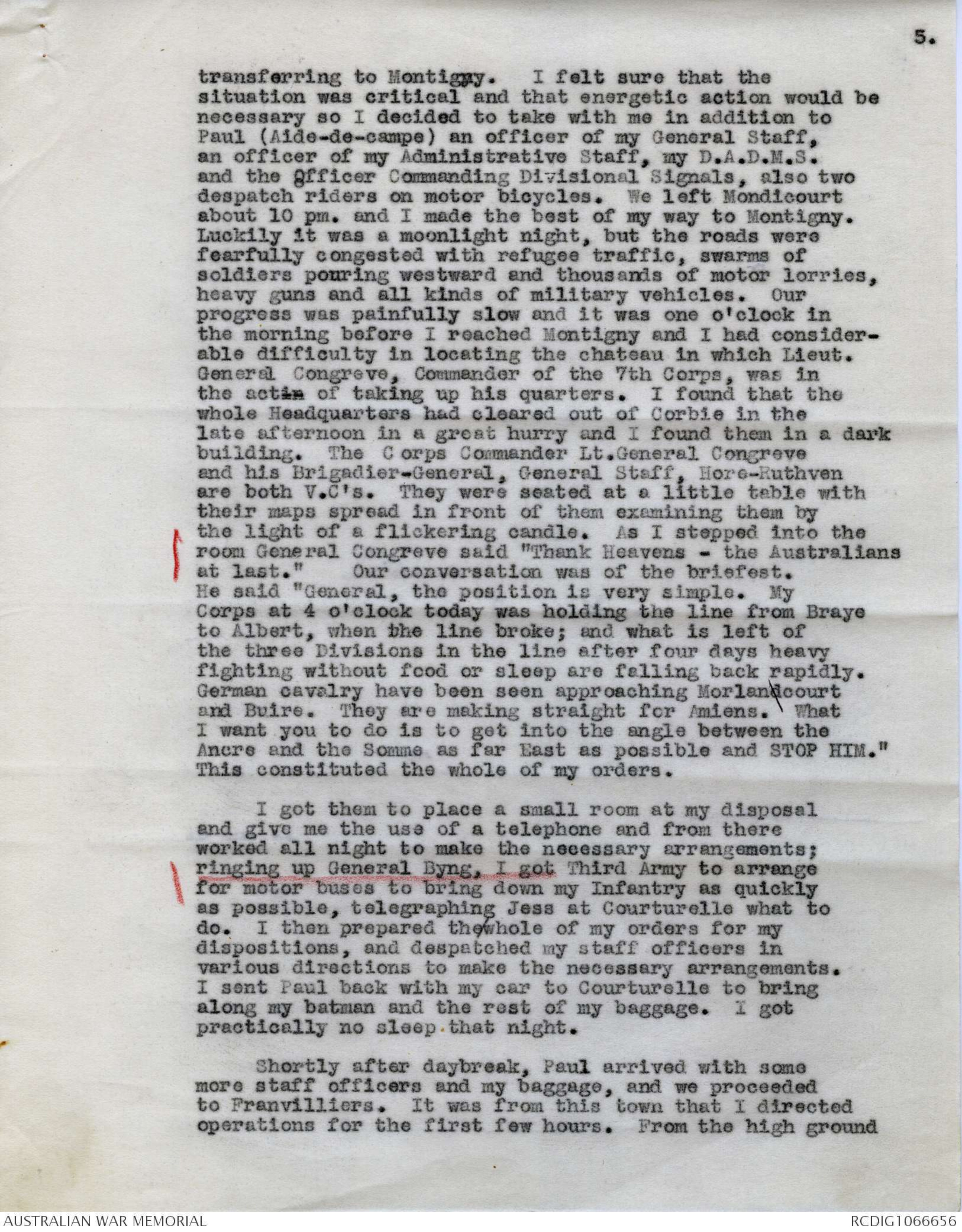
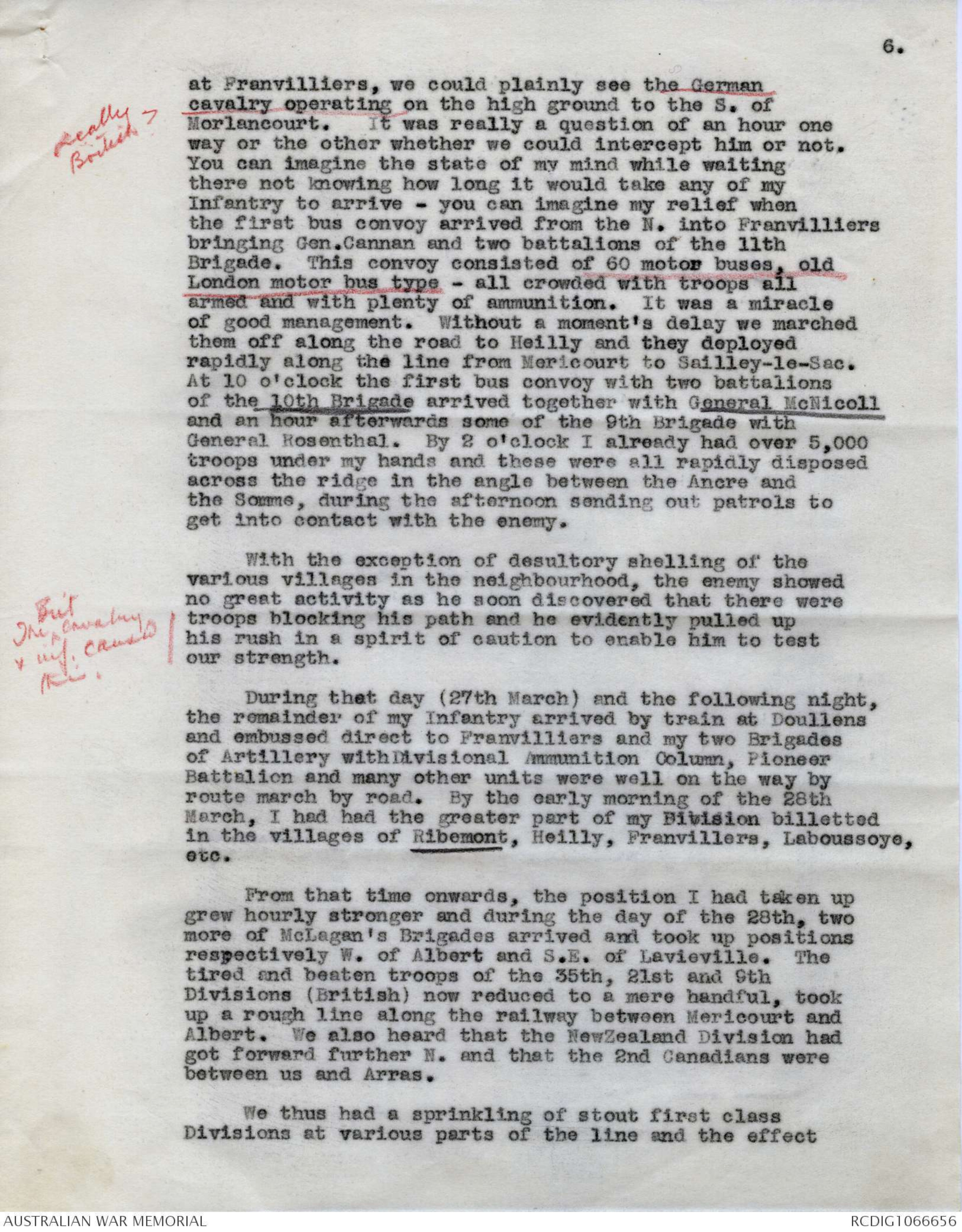
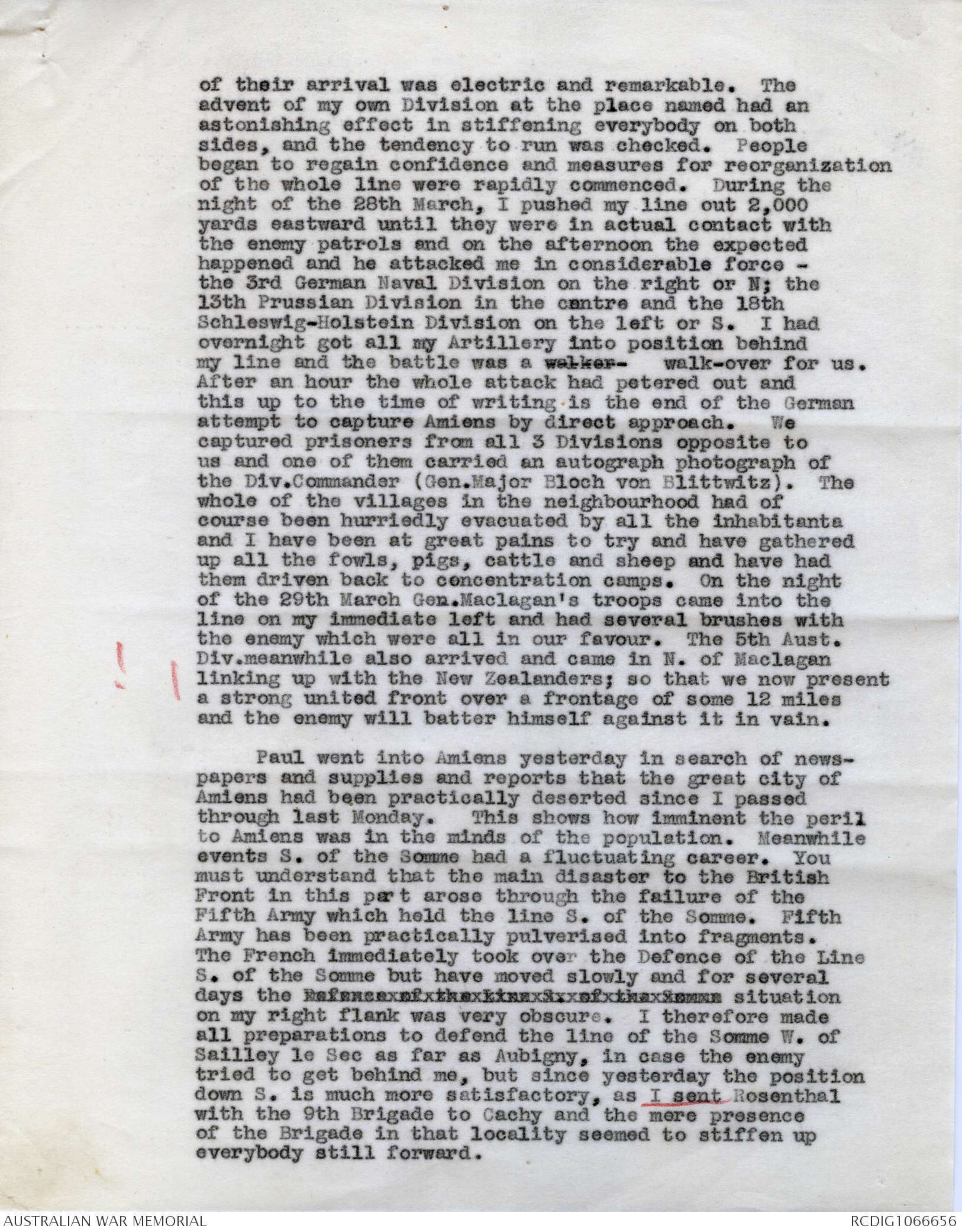
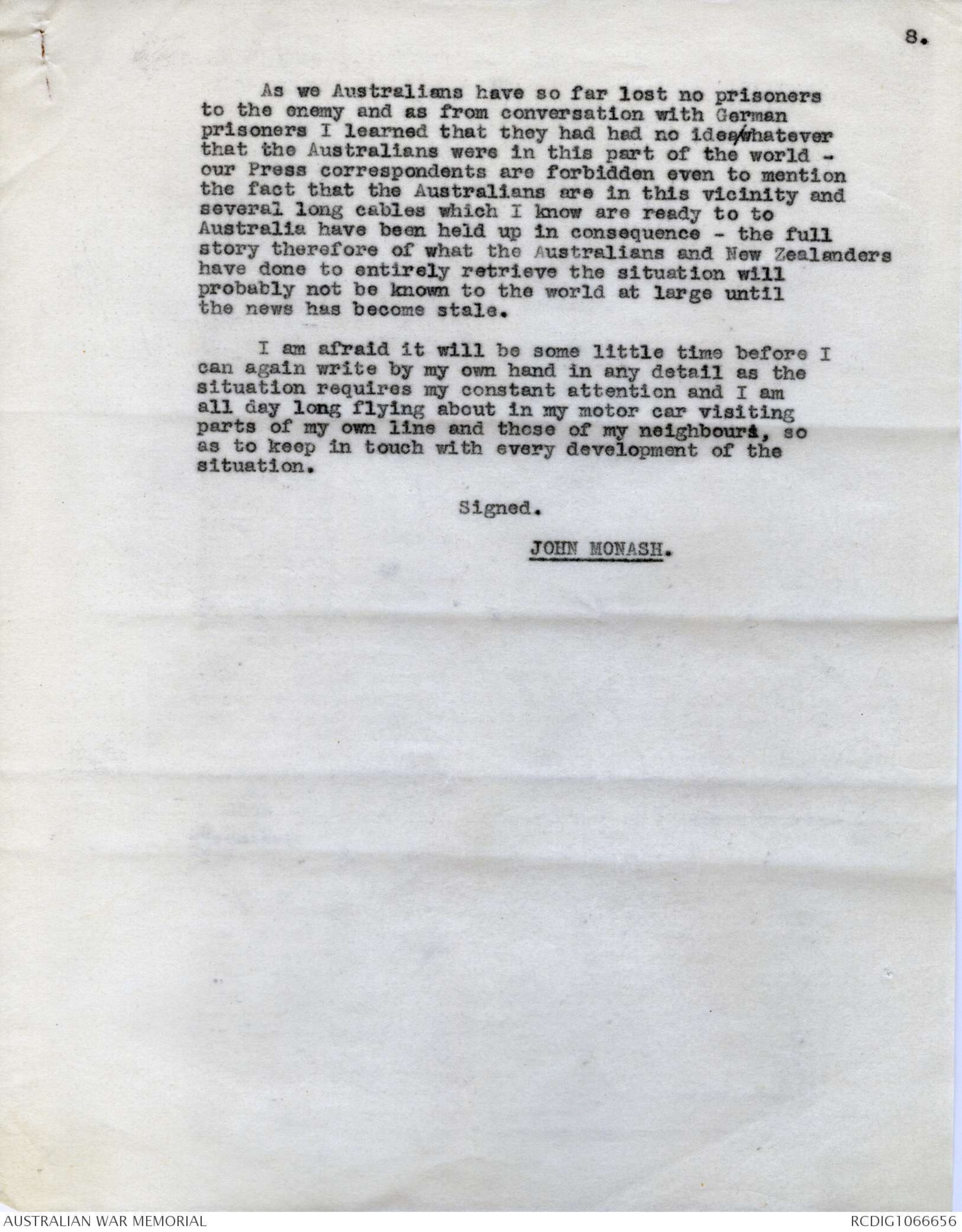
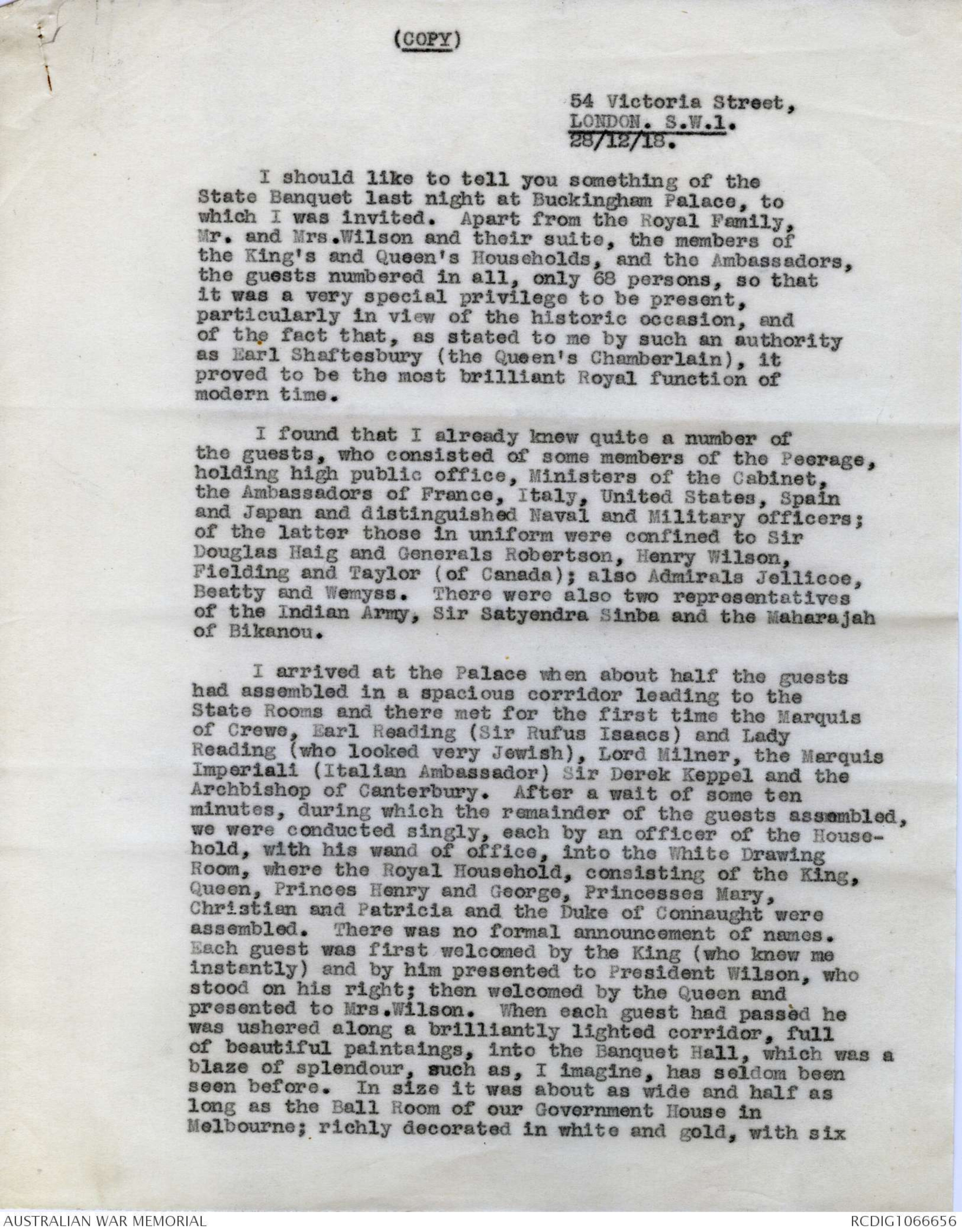
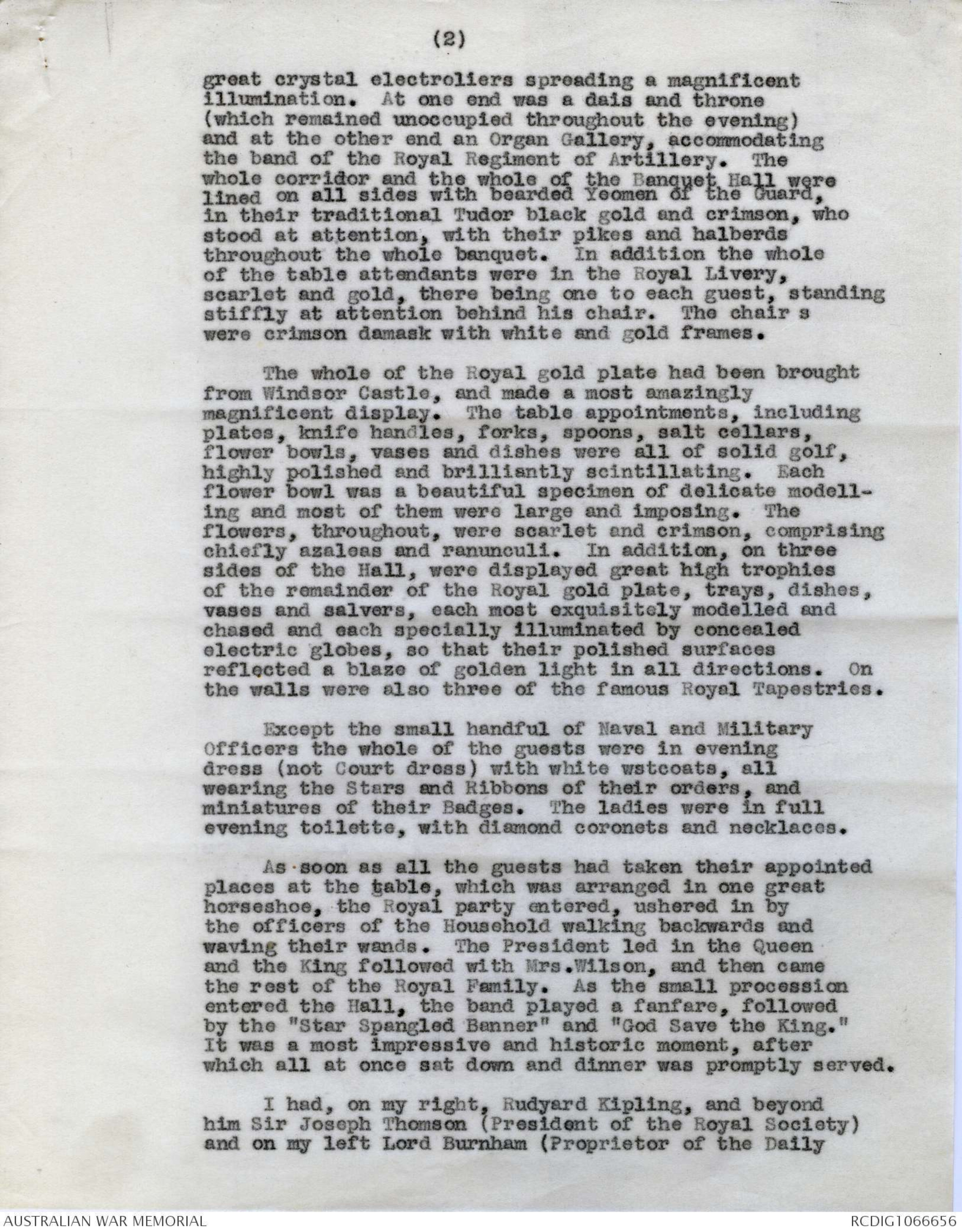
(COPY)
FRANCE. 2nd April 1918.
Dear Mat,
I seize upon a little interlude of comparative
leisure to try and give you a connected account of
the very exciting events of the past few days.
When the great German offensive broke out on
March 22nd, I was on holiday in the Riviera staying
at Menton, intending to remain there until the end
of the month. One of my Brigadiers - Brigadier-General
Rosenthal - had also come down a day or two before on
sick leave, really to recoup after having been slightly
gassed and was staying at Lord Michelham's Home for
convalescent officers at Cap Martin close to Menton.
He and I had spent the whole of Saturday, the 23rd,
together in making a very pleasant mountain tour to
La Turbie the hill above Monaco and walking thence
towards Nice along the Route de la Corniche as far as
the little medieval village of Exe, then down to Beaulieu
and home by electric tram. We had separated for the day
and had planned to make up a motor party next day to go
into Italy as far as San Remo, having obtained special
passports for a party of four Generals and motor driver
for this purpose. The newspapers which arrived that
evening at Menton gave us the first news of what was
happening and I felt that it was inevitable that we
ought to return at once. I had left my Division in a
back area (Nielles-les-Blequin) about 20 miles East of
Boulogne, resting and training and I was convinced that
it would not be a matter of many days before they would
be drawn into the fight in some capacity or other. While
I was deliberating what I had better do, a telegram
arrived from Jess to say that the Division had been
ordered to move eastward towards Ypres, and although I
could not quite understand why the move should be in
that direction the news made me decide definitely to
return the next day.
By dint of the influence of my rank and statue,
I got the authorities at Cap Martin to make special
arrangements to reserve a carriage on the train on
Sunday morning, March 24th for myself and General Rosenthal
and I wired toJess (Brigadier-General Jess) to send
Paul (Capt.Simonson) with my car to Paris. The railway
journey to Paris was uneventful and for a wonder, the
train arrived punctually to time at 8-45 on Monday morning
the 25th. It was on Sunday the 25th that Paris was heavily
shelled for the first time by that wonderful long range gun.
Paul duly met me at the Gare de Lyon with the car
and we stayed in Paris only long enough to get a snatch
of breakfast and a wash and to pick up some baggage
2.
which I had left there on my way down South. By 10 o'clock
we wore clear of Paris and bowling at a great rate along
splendid roads via Beauvais to Amiens. At Amiens we
found everything in a state of frightful confusion. The
Bosche had been heavily bombing the town and the civilians
were evacuating it rapidly. There was great excitement.
The railway square and the streets were full of war-worn
mud-bespattered, excited and starved looking troops of
all kinds and excited officers and other ranks who had
been on leave and were struggling to get back to their
units in various parts of the front. Amiens being an important
interchange station - all the normal activities of
the city seemed to have been arrested. The Railway
Transport Officers and the Military authorities in the
Town had no news of events at the Front, and had been
working for several days with their staffs without sleep
and were in a condition almost of mental paralysis. The
ordinary supply depots had ceased to function, we could
hardly got any petrol or tyres to replenish our needs,
and it was with some difficulty we managed to get some
lunch. At the railway station I was fortunate enough to
pick up letters from Jess which Wieck had brought down
that morning telling me that the Division (111) on its
march towards Ypres had been intercepted on the road
and deflected southward and that it would lie that night
at Blaringham, and that it had been ordered to stand by
to entrain during that night and next day for Doullens.
Wieck had come down ahead to try and find the 10th Corps
Headquarters, as it was understood we should report
to the 10th Corps for orders. I thereupon decided to push
on to Doullens to get closer and more definite news.
Arrived there about 3 o'clock and found a motor omnibus
load of my officers and N.C.O's just arrived, they having
been sent down from the Division to stand by for billeting
duties when it had been determined where the Divison was
to go. There I got into touch with Captain Pyke and Major
Wieck who were out examining the various villages in the
vicinity for billeting accommodation, but had no further
news. At Doullens, there was still great confusion,
and streams of soldier-stragglers pouring in from the
east with the most hair-raising stories that the Bosche
was almost on top of them. As, again, at Doullens I
could find nobody in any authority who know anything of
any value I decided again to push on and get in touch
with my own Headquarters. This I did, reaching Blaringham
at about 7 o'clock and found there everything packed up
to be ready for a shift next day. All that night my
Infantry were entraining at three stations respectively
Arques, St.Omer, and Steenbecque. The Artillery and
Divisional Ammunition Column were already on the march
southwards.
I snatched a few hours sleep at Blaringhem and left
early on the morning of the [*?*]25th March back for the South,
trying to find thel0th Corps. By this time of course, the
3.
trouble was that all Headquarters, both Divisional, Corps
and Army, were rapidly on the move backwards and did not
remain more than a few hours in any one town. All signal
communication by telephoneor telegraph was of course
cut off, and, as the whole place was full of the wildest
and most contradictory rumours, it was very difficult to
locate anybody - however, I managed to glean that 10th
Corps was moving to Hawtecloque and reaching there learned
that the Corps Commander of the 10th Corps was still at
Frevant. There I repaired with all haste and learned
from him that he was trying to collect a few Divisions
with a view to making a stand east of Doullens and generally
re-establish a line between Arras and Albert. He could give
me no definite orders except to concentrate on my
Division to the East of Doullens and there await further
orders. We pushed on to Doullens and there tumbled into
a scene of almost indescribable confusion. During the
24 hours between my two visits to that town, there had
been a great change in the atmosphere. Doullens was
full of civilian refugees and many thousands of soldiers
who had got detached from their units and who were
streaming in from the East. All had the wildest stories
and all looked starved and broken down with fatigue and
want of sleep. There must have been a great conference
between the British and French High Command in the
Mairie at Doullens for the Town Square was packed full
of motor cars and brilliantly uniformed French and
British officers. I had, however, no time for them as
I had more important things in hand. Here occurred
another piece of good fortune on a par with all that
seems to have dogged my footsteps throughout all these
exciting times. I arrived at Doullens railway station
just at the very moment that the first train bringing
some of the troops of my 9th Brigade arrived in the station
yard. There was on board the 9th Brigade Headquarters
with Brig. General Rosenthal and all his staff and signal
personnell, etc., and a portion of the 33rd Battalion.
While they were in the act of detraining, an excited
officer, who proved to be the Town Major of Doullens,
rushed up to say that the report had just come in that
a number of German armoured motor cars had broken through
at Hubuterne, and that the German cavalry were within
ten miles or the Town. I may say that these rumours, at
this stage were subsequently proved to be without
foundation but they were just an example of the condition
of chaos which reigned supreme in the whole of this part
of the country. [*Monash's order Thence to Fremicourt*] I instructed General Rosenthal at once
to collect all the troops he could and temporarily take
up a position to cover Doullens so that my detrainment at
that station from the numerous trains subsequently to
arrive might be carried out without interference. Knowing
that my 10th Brigade was to detrain at Mondicourt, Paul
and I motored as fast as possible to that town and
again arrived just as General McNicoll's first train
4.
drew into the station. We rapidly got all the troops
out and McNicoll took up with a portion of the 37th
Battalion a position to cover the detrainment at
Mondicourt. All the roads leading from the S.E. into
Mondicourt were simply packed with wild-eyed Tommies,
refugees on foot in every conceivable conveyance with
their furniture in wheelbarrows, hand-carts, farm-wagons
and the like and every conceivable kind of military
vehicle streaming N.W. Everybody that was interrogated
appeared to have the ideathat the Bosche was just behind
him on his very heels. I put on military police to
establish stragglerposts and we held up hundreds of
Tommies with and without rifles and equipment and formed them
into bodies suitable for employment if required. I
proceeded myself to Courturelle, just N. of Doullens -
[*Thence to Couturelle [[??]] [[false?]] then to [[?]]*]
on the Arras Road, and selected a nice chateau for my
Headquarters and established signal communication with
the 10th Corps at Frevant. There I learned that there was
no confirmation of the report that the Bosche motor cars had
broken through at Hubeterne. I also learned that
General Maclagan had arrived at Basseux and that the 4th
Australian Division was in the act of arriving in the area.
I proceeded at once by motor car to Basseux and got into
touch with Maclagan. He told me that he had only one
Brigade of Infantry in hand and had sent them in the
direction of Heuburterne to close what was evidently a
gap in the British line. This Brigade was my old 4th
Brigade under General Brand. I then rushed back to
Mondicourt as quickly as the congested state of the road
would allow. Every kind of vehicle in every stage of
panic was rushing along this road towards Doullens and
that the enemy was not far away was evidenced by the fact
that numerous shells fell on and near the road as we
passed, scattering the traffic in all directions. The
point was that much of this panic proved ultimately to
be quite without justification. Again reaching Mondicourt,
I there issued orders for the concentration of my three
Brigades as follows - 9th Brigade at Pas, 10th Brigade
at Authie and 11th Brigade at Couin - although up to
that time none of the units of the 11th Brigade had yet
arrived by train. I then returned by car to my chateau
at Courturelle reaching there about 8pm.
A Despatch Rider arrived from the 10th Corps to say
that the 10th Corps was no longer G.H.Q.Reserve but had
passed under thecommand of the Third Army (General Byng.)
He was followed within about an hour by a second Despatch
Rider with orders that I should personally report at
once to the 7th Corps at Corbie as orders had been
received that the Division would probably be transferred
to the 7th Corps and act under its orders. I was getting
ready to proceed there when a further Despatch Rider
arrived stating that the 7th Corps at Corbie had had to
abandon Corbie as it was being heavily shelled and were
5.
transferring to Montigny. I felt sure that the
situation was critical and that energetic action would be
necessary so I decided to take with me in addition to
Paul (Aide-de-campe) an officer of my General Staff,
an officer of my Administrative Staff, my D.A.D.M.S.
and the Officer Commanding Divisional Signals, also two
despatch riders on motor bicycles. We left Mondicourt
about 10 pm. and I made the best of my way to Montigny.
Luckily it was a moonlight night, but the roads were
fearfully congested with refugee traffic, swarms of
soldiers pouring westward and thousands of motor lorries,
heavy guns and all kinds of military vehicles. Our
progress was painfully slow and it was one o'clock in
the morning before I reached Montigny and I had considerable
difficulty in locating the chateau in which Lieut.
General Congreve, Commander of the 7th Corps, was in
the actin of taking up his quarters. I found that the
whole Headquarters had cleared out of Corbie in the
late afternoon in a great hurry and I found them in a dark
building. The Corps Commander Lt.General Congreve
and his Brigadier-General, General Staff, Hore-Ruthven
are both V.C's. They were seated at a little table with
their maps spread in front of them examining them by
the light of a flickering candle. As I stepped into the
room General Congreve said "Thank Heavens - the Australians
at last. Our conversation was of the briefest.
He said "General, the position is very simple. My
Corps at 4 o'clock today was holding the line from Braye
to Albert, when the line broke; and what is left of
the three Divisions in the line after four days heavy
fighting without food or sleep are falling back rapidly.
German cavalry have been seen approaching Morlandcourt
and Buire. They are making straight for Amiens. What
I want you to do is to get into the angle between the
Ancre and the Somme as far East as possible and STOP HIM."
This constituted the whole of my orders.
I got them to place a small room at my disposal
and give me the use of a telephone and from there
worked all night to make the necessary arrangements;
ringing up General Byng, I got Third Army to arrange
for motor buses to bring down my Infantry as quickly
as possible, telegraphing Jess at Courturelle what to
do. I then prepared the whole of my orders for my
dispositions, and despatched my staff officers in
various directions to make the necessary arrangements.
I sent Paul back with my car to Courturelle to bring
along my batman and the rest of my baggage. I got
practically no sleep that night.
Shortly after daybreak, Paul arrived with some
more staff officers and my baggage, and we proceeded
to Franvilliers. It was from this town that I directed
operations for the first few hours. From the high ground
6.
at Franvilliers, wo could plainly see the German
[*Really
British?*]
cavalry operating on the high ground to the S. of
Morlancourt. It was really a question of an hour one
way or the other whether we could intercept him or not.
You can imagine the state of my mind while waiting
there not knowing how long it would take any of my
Infantry to arrive - you can imagine my relief when
the first bus convoy arrived from the N. into Franvilliers
bringing Gen. Cannan and two battalions of the 11th
Brigade. This convoy consisted of 60 motor buses, old
London motor bus type - all crowded with troops all
armed and with plenty of ammunition. It was a miracle
of good management. Without a moment's delay we marched
them off along the road to Heilly and they deployed
rapidly along the line from Mericourt to Sailley-le-Sac.
At 10 o'clock the first bus convoy with two battalions
of the 10th Brigade arrived together with General McNicoll
and an hour afterwards some of the 9th Brigade with
General Rosenthal. By 2 o'clock I already had over 5,000
troops under my hands and these were all rapidly disposed
across the ridge in the angle between the Ancre and
the Somme, during the afternoon sending out patrols to
get into contact with the enemy.
With the exception of desultory shelling of the
various villages in the neighbourhood, the enemy showed
no great activity as he soon discovered that there were
[*The ^Brit Cavalry
& inf. caused
this*]
troops blocking his path and he evidently pulled up
his rush in a spirit of caution to enable him to test
our strength.
During that day (27th March) and the following night
the remainder of my Infantry arrived by train at Doullens
and embussed direct to Franvilliers and my two Brigades
of Artillery withDivisional Ammunition Column, Pioneer
Battalion and many other units were well on the way by
route march by road. By the early morning of the 28th
March, I had had the greater part of my Division billetted
in the villages of Ribemont, Heilly, Franvillers, Laboussoye,
etc.
From that time onwards, the position I had taken up
grew hourly stronger and during the day of the 28th, two
more of McLagan's Brigades arrived and took up positions
respectively W. of Albert and S.E. of Lavieville. The
tired and beaten troops of the 35th, 21st and 9th
Divisions (British) now reduced to a mere handful, took
up a rough line along the railway between Mericourt and
Albert. We also heard that the NewZealand Division had
got forward further N. and that the 2nd Canadians were
between us and Arras.
We thus had a sprinkling of stout first class
Divisions at various parts of the line and the effect
of their arrival was electric and remarkable. The
advent of my own Division at the place named had an
astonishing effect in stiffening everybody on both
sides, and the tendency to run was checked. People
began to regain confidence and measures for reorganization
of the whole line were rapidly commenced. During the
night of the 28th March, I pushed my line out 2,000
yards eastward until they were in actual contact with
the enemy patrols and on the afternoon the expected
happened and he attacked me in considerable force -
the 3rd German Naval Division on the right or N; the
13th Prussian Division in the centre and the 18th
Schleswig-Holstein Division on the left or S. I had
overnight got all my Artillery into position behind
my line and the battle was a walker- walk-over for us.
After an hour the whole attack had petered out and
this up to the time of writing is the end of the German
attempt to capture Amiens by direct approach. We
captured prisoners from all 3 Divisions opposite to
us and one of them carried an autograph photograph of
the Div.Commander (Gen. Major Bloch von Blittwitz). The
whole of the villages in the neighbourhood had of
course been hurriedly evacuated by all the inhabitanta
and I have been at great pains to try and have gathered
up all the fowls, pigs, cattle and sheep and have had
them driven back to concentration camps. On the night
of the 29th March Gen. Maclagan's troops came into the
line on my immediate left and had several brushes with
the enemy which were all in our favour. The 5th Aust.
[*!*] Div.meanwhile also arrived and came in N. of Maclagan
linking up with the New Zealanders; so that we now present
a strong united front over a frontage of some 12 miles
and the enemy will batter himself against it in vain.
Paul went into Amiens yesterday in search of newspapers
and supplies and reports that the great city of
Amiens had been practically deserted since I passed
through last Monday. This shows how imminent the peril
to Amiens was in the minds of the population. Meanwhile
events S. of the Somme had a fluctuating career. You
must understand that the main disaster to the British
Front in this part arose through the failure of the
Fifth Army which held the line S. of the Somme. Fifth
Army has been practically pulverised into fragments.
The French immediately took over the Defence of the Line
S. of the Somme but have moved slowly and for several
days the Defence of the Line S. of the Somme situation
on my right flank was very obscure. I therefore made
all preparations to defend the line of the Somme W. of
Sailley le Sec as far as Aubigny, in case the enemy
tried to get behind me, but since yesterday the position
down S. is much more satisfactory, as I sent Rosenthal
with the 9th Brigade to Cachy and the mere presence
of the Brigade in that locality seemed to stiffen up
everybody still forward.
8.
As we Australians have so far lost no prisoners
to the enemy and as from conversation with German
prisoners I learned that they had had no idea/whatever
that the Australians were in this part of the world -
our Press correspondents are forbidden even to mention
the fact that the Australians are in this vicinity and
several long cables which I know are ready to to
Australia have been held up in consequence - the full
story therefore of what the Australians and New Zealanders
have done to entirely retrieve the situation will
probably not be known to the world at large until
the news has become stale.
I am afraid it will be some little time before I
can again write by my own hand in any detail as the
situation requires my constant attention and I am
all day long flying about in my motor car visiting
parts of my own line and those of my neighbours, so
as to keep in touch with every development of the
situation.
Signed.
JOHN MONASH.
(COPY)
54 Victoria Street,
LONDON. S.W.1.
28/12/18.
I should like to tell you something of the
State Banquet last night at Buckingham Palace, to
which I was invited. Apart from the Royal Family,
Mr. and Mrs.Wilson and their suite, the members of
the King's and Queen's Households, and the Ambassadors,
the guests numbered in all, only 68 persons, so that
it was a very special privilege to be present,
particularly in view of the historic occasion, and
of the fact that, as stated to me by such an authority
as Earl Shaftesbury (the Queen's Chamberlain), it
proved to be the most brilliant Royal function of
modern time.
I found that I already knew quite a number of
the guests, who consisted of some members of the Peerage,
holding high public office, Ministers of the Cabinet,
the Ambassadors of France, Italy, United States, Spain
and Japan and distinguished Naval and Military officers;
of the latter those in uniform were confined to Sir
Douglas Haig and Generals Robertson, Henry Wilson,
Fielding and Taylor (of Canada); also Admirals Jellicoe,
Beatty and Wemyss. There were also two representatives
of the Indian Army, Sir Satyendra Sinba and the Maharajah
of Bikanou.
I arrived at the Palace when about half the guests
had assembled in a spacious corridor leading to the
State Rooms and there met for the first time the Marquis
of Crewe, Earl Reading (Sir Rufus Isaacs) and Lady
Reading (who looked very Jewish), Lord Milner, the Marquis
Imperiali (Italian Ambassador) Sir Derek Keppel and the
Archbishop of Canterbury. After a wait of some ten
minutes, during which the remainder of the guests assembled
we were conducted singly, each by an officer of the Household,
with his wand of office, into the White Drawing
Room, where the Royal Household, consisting of the King,
Queen, Princes Henry and George, Princesses Mary
Christian and Patricia and the Duke of Connaught were
assembled. There was no formal announcement of names.
Each guest was first welcomed by the King (who knew me
instantly) and by him presented to President Wilson, who
stood on his right; then welcomed by the Queen and
presented to Mrs.Wilson. When each guest had passed he
was ushered along a brilliantly lighted corridor, full
of beautiful paintaings, into the Banquet Hall, which was
blaze of splendour, such as, I imagine, has seldom been
seen before. In size it was about as wide and half as
long as the Ball Room of our Government House in
Melbourne; richly decorated in white and gold, with six
(2)
great crystal electroliers spreading a magnificent
illumination. At one end was a dais and throne
(which remained unoccupied throughout the evening)
and at the other end an Organ Gallery, accommodating
the band of the Royal Regiment of Artillery. The
whole corridor and the whole of the Banquet Hall were
lined on all sides with bearded Yeomen of the Guard,
in their traditional Tudor black gold and crimson, who
stood at attention, with their pikes and halberds
throughout the whole banquet. In addition the whole
of the table attendants were in the Royal Livery,
scarlet and gold, there being one to each guest, standing
stiffly at attention behind his chair. The chair s
were crimson damask with white and gold frames.
The whole of the Royal gold plate had been brought
from Windsor Castle, and made a most amazingly
magnificent display. The table appointments, including
plates, knife handles, forks, spoons, salt cellars
flower bowls, vases and dishes were all of solid golf,
highly polished and brilliantly scintillating. Each
flower bowl was a beautiful specimen of delicate modelling
and most of them were large and imposing. The
flowers, throughout, were scarlet and crimson, comprising
chiefly azaleas and ranunculi. In addition, on three
sides of the Hall, were displayed great high trophies
of the remainder of the Royal gold plate, trays, dishes,
vases and salvers, each most exquisitely modelled and
chased and each specially illuminated by concealed
electric globes, so that their polished surfaces
reflected a blaze of golden light in all directions. On
the walls were also three of the famous Royal Tapestries.
Except the small handful of Naval and Military
Officers the whole of the guests were in evening
dress (not Court dress) with white wstcoats, all
wearing the Stars and Ribbons of their orders, and
miniatures of their Badges. The ladies were in full
evening toilette, with diamond coronets and necklaces.
As soon as all the guests had taken their appointed
places at the table, which was arranged in one great
horseshoe, the Royal party entered, ushered in by
the officers of the Household walking backwards and
waving their wands. The President led in the Queen
and the King followed with Mrs.Wilson, and then came
the rest of the Royal Family. As the small procession
entered the Hall, the band played a fanfare, followed
by the "Star Spangled Banner" and "God Save the King."
It was a most impressive and historic moment, after
which all at once sat down and dinner was promptly served.
I had, on my right, Rudyard Kipling, and beyond
him Sir Joseph Thomson (President of the Royal Society)
and on my left Lord Burnham (Proprietor of the Daily
 Sam scott
Sam scottThis transcription item is now locked to you for editing. To release the lock either Save your changes or Cancel.
This lock will be automatically released after 60 minutes of inactivity.